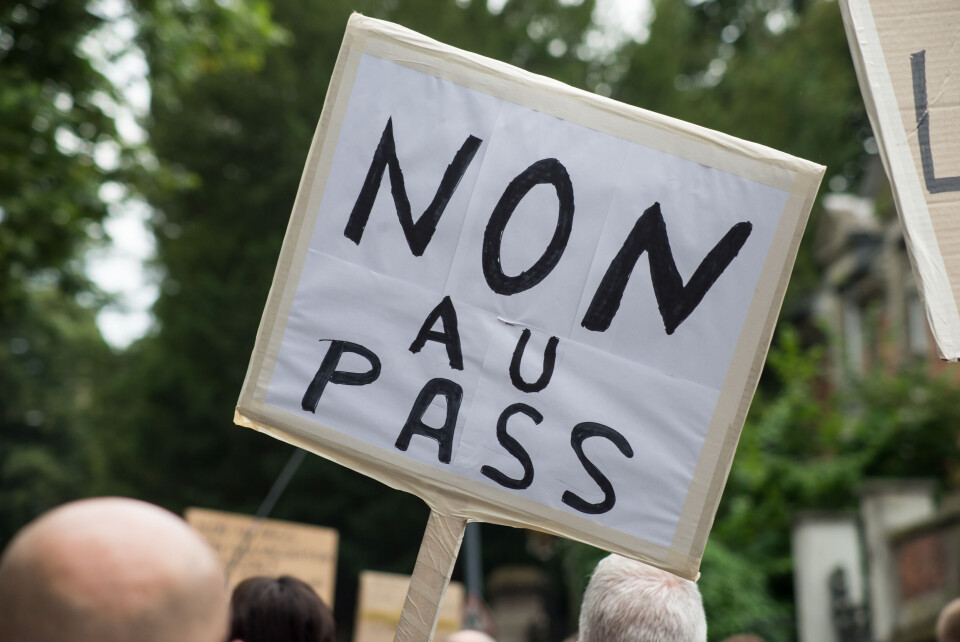-
New civic tests for foreigners in France launch amid criticism
Applicants for some types of residency cards must now take 45-minute test
-
Workers in France can take 17-day break using only eight days of leave in 2026
Favourable calendar for public holidays makes extended May break possible, with five guaranteed long weekends throughout year
-
David Hockney among France’s New Year honours list
Former Normandy resident awarded second grade of honour
Paris police ban anti-vaccine pass ‘freedom convoy’ as hundreds on way
The Canada-inspired movement is also motivated by the same cost of living concerns which sparked the first gilets jaunes protests in 2018

‘Freedom convoys’ of drivers protesting against France’s vaccine pass system – among other issues – have been banned in the capital by Paris’ police prefecture this weekend.
Read more:Drivers in France plan Canada-style ‘freedom convoy’ over vaccine pass
The police cite “the risk of disrupting public order” in a decree issued today (February 10) prohibiting protesters from engaging in convoys and blocking roads within the city between Friday and Monday inclusive.
Convois de véhicules à Paris : le préfet de Police prend un arrêté d'interdiction.
— Préfecture de Police (@prefpolice) February 10, 2022
Consultez notre communiqué de presse 👇 pic.twitter.com/8Jq1r2SIYj
Several hundred HGV, car and campervan drivers are already known to be en route for Paris having set off from Nice, Bayonne, Perpignan and other cities yesterday. The prefecture of the Alpes-Maritimes region reported the departure of 180 people in around 60 vehicles from Nice in the morning.
Those taking part told the press they plan a peaceful protest against the government’s vaccine pass and have been inspired by a similar movement which began in Canada. A state of emergency has since been declared in Ottawa over the blockades.
“The objective [of the French protesters] appears to be to ‘block the capital’ by clogging up traffic in the streets of Paris to promote their demands, before continuing their journey towards Brussels on Monday, February 14,” the police said in a statement.
“We cannot allow life to be blocked off,” François Bayrou, president of the Democratic Movement (MoDem) and mayor of Pau, told BFMTV.
“We cannot allow the opinion of a minority to prevent other people from living.
“I think it is the responsibility of police forces to ensure order, to make sure that people can move about, go shopping. I am trying to understand what is going on in the minds of the protesters, of those who are rejecting the system, but I also see the victims.
“In a town like Pau, business owners are exasperated by the situation. Every Saturday for the past year they have been prevented from doing their job by protests.”
People found to be blocking a public road could face up to two years in prison and a €4,500 fine, while organising a prohibited protest is punishable by six months in prison and a €7,500 fine. Anyone participating in that banned protest can also be fined €135.
A movement similar to that of the gilets jaunes
Regional authorities say they are “closely” monitoring the situation, having observed that the movement is “far from being thoroughly structured” but that they could give “new momentum” to the gilets jaunes movement and to anti-vaccine pass conspiracy theories, Franceinfo reports.
Read more: Who are the gilets jaunes today?
One protester, Amaury Martelet, told Franceinfo that the ‘freedom convoy’ is about “recovering our liberty, which has been limited by the current government,” especially with regards to “the obligatory vaccine pass, which restricts freedom and is not a signal of a proper democracy.”
Others insist that this is not a protest against the Covid vaccines but against constraints placed on unvaccinated people. “Recently, I have been protesting against the vaccine pass in Lyon,” said Marc. “It is a measure that I do not understand, but I am saying this as someone who has had three vaccine doses.”
Comparisons with the gilets jaunes have been drawn because the drivers are also protesting against sharp rises in the price of fuel and increases in French toll roads, which came into effect this month.
This echoes the subject of the protests which took place from 2018-2020, during which working and middle class workers and retirees railed against an increasing cost of living (and especially fuel prices) and growing economic inequality.
Read more: Inflation in France set to reach 3%: Tips for saving on prices
Regional authorities have also suggested that the ‘freedom convoys’ are currently only experiencing a “virtual success,” adding that: “The Canadian operation is echoing strongly across French social networks, most notably among anti-pass, conspiracy and gilets jaunes movements.”
Some prominent players of the original gilets jaunes movement have distanced themselves from this event, with one, Maxime Nicolle, calling it “a one-off.”
However, other figures, including lawyer Juan Branco, who represented some protesters in court, have declared their support for the ‘freedom convoys’.
Mr Branco has published advice online for people who are stopped by the police, and gilets jaunes activist Jérôme Rodrigues has posted a video on Twitter criticising the government, suggesting that he will be taking part in the protests and claiming that: “If we had a good president there wouldn’t be any convoys.”
‘Lack of coordination’
However, regional authorities have stressed that: “The solidarity displayed with regards to the event does not [necessarily] translate to a desire to participate in person.” Although there are around 340,000 members of the principal ‘freedom convoy’ Facebook group, the actual number of protesters is likely to be lower than social media interest may suggest.
The plan is to arrive in Paris for the weekend and then head to Brussels on Monday, but regional authorities report “disparate pieces of information” being relayed, creating a “lack of coordination” which “is reminiscent of the internal tensions which have already been observed within the gilets jaunes movement.”
For example, while some protesters call for full roadblocks which will cause disruption to the transport of food supplies and fuel, others insist on a “peaceful” movement.
It also remains unclear whether a specific meeting place has been agreed by the protesters heading for Paris.
Government spokesperson Gabriel Attal announced yesterday that the vaccine pass system could be removed at the end of March or the beginning of April if the Covid situation allows, but this does not appear to have placated the protesters.
Related stories
Vaccine pass could end by April, says France’s Covid strategy head
Regulated prices keep France’s electricity cheaper than EU neighbours
























